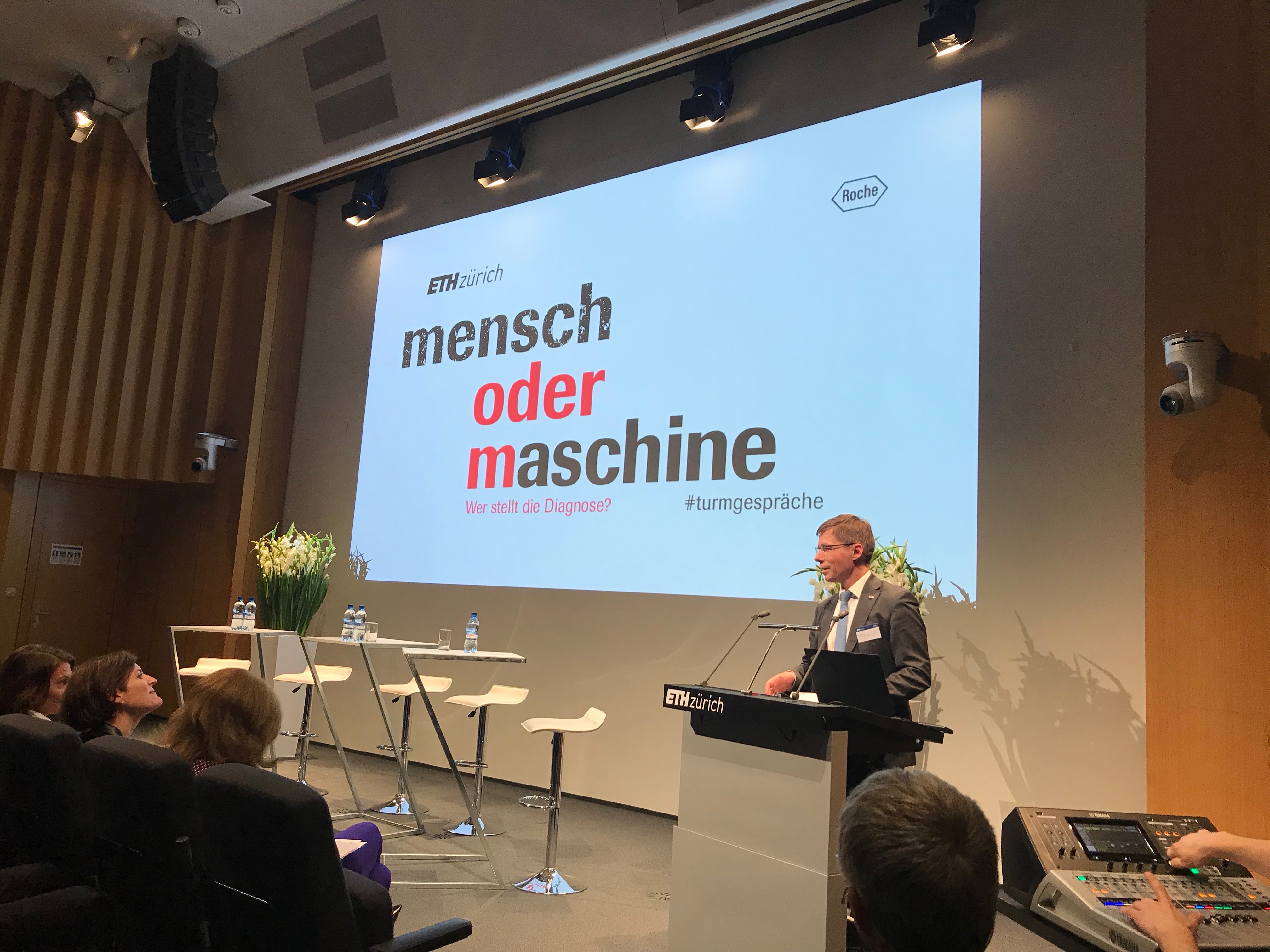Dr. Daniel Stauffacher and Regina Surber of the Zurich Hub for Ethics and Technology (ZHET) participated at the discussion event ‘Mensch oder Maschine – Wer stellt die Diagnose?, co-organised by the pharmaceutical company Roche and the University ETH in Zurich, on 8 May 2019.
One of the firsts of its kind, this very important panel opened the discussion about the transformative change of current and future healthcare through new technologies.
Artificial Intelligence (AI) and Robotics are already a given in our modern technological lives. Those technologies – and others – also fundamentally influence the healthcare sector, a fact that raises pressing questions, such as: What is the role of future medical doctors? How can we best use new technologies in healthcare without losing the all-important personal element of the doctor-patient relationship? Which human medical aspects are quantifiable and might therefore be outsourced or supported by, e.g., AI-enabled technologies, and which are not, and will still require human power and discernment?
Those and further questions were discussed by:
- Tim Jaeger, Global Head of Diagnostics Information Solutions, Roche
- Joachim Buhmann, Professor for Computer Science, ETH Zurich
- Susanne Driessen, President of swissethics and the Ethics Commission of Eastern Switzerland
- Pius Bürki, Paediatrician and board member of MFE, responsible for eHealth
The panel was moderated by Marina Villa, SRF.
Although the topic has only been broached and further discussion about healthcare change through emerging technologies are needed on many levels of society – in hospitals, in academia and in the political sphere – the following points made by the panelists merit mentioning as well as further elaboration:
- Medical processes that are objectifiable can easily be algorithmized, and the benefits of new technologies, e.g. their capacity to process vast amounts of information, could be harvested for high precision diagnostics or the preparation of clinical decision-making systems. Technology can reduce complexity. On this aspect, see Tim Jaeger’simportant statement:
“It is important to correctly assign the tasks to human or machine according to the respective strengths. An important role of doctors in supporting responsible citizens is the simple transfer and application of medical knowledge. However, knowledge of diseases, diagnostics and types of treatment is extensive and growing rapidly. No single physician can always have this knowledge available in its entirety in order to formulate specific therapy recommendations for each individual patient. Technology can be very helpful in reducing this complexity – and that’s what we’re focusing on.”
- Yet, as not all medical processes are measurable (as of today), e.g. biopsychological processes, new software and machines will, arguably, never completely replace the human medical doctor.
- What is more, as human interaction, communication and trust arguably have a strong influence on personal healing processes, the role of the doctor will remain important.
- From an ethical perspective, it is crucial to distinguish the ‘good’ from a ‘correct’ decision: A software-supported decision might be good for a patient, as it takes all the measurable medical information/ data into account. However, an algorithmic decision might not always be ‘right’, as individual personal conditions (e.g. situation at home, personal non-medical history of a patient, etc.) can only be perceived from a human doctor.
- Future medical doctors will be increasingly supported by intelligent software and machines. Therefore they have to be able to critically reflect upon the digital diagnosis, prognosis and therapy support and to be able to sufficiently understand the technological processes. This requires an integration of technology training for students of medicine.
- Until now, many aspects of our human lives have been regulated by human technological incapacity. Now that new technologies are applicable to some of those aspects, e.g. health and -care, the space for choosing how those aspects should be regulated opens up. The most prominent example is the question on medical data ownership. Does health data belong to the patient, to the doctor or to a research lab that can use the information to study new ways of treating a dangerous disease? Data is knowledge – but, to whom does this knowledge belong? Currently, this is not regulated by law. Therefore, it is a pressing necessity to open up this discussion to a broader public and to integrate it into the political arena.
- Arguably the most important point was made in the opening speechby Prof. Joël Mesot, President of the ETH Zurich:
«One thing is very clear to me: the future relationship between human and machine will not be characterized by determinism; it will be up to us humans to decide how we want to shape this relationship.»
In order to make sure that it is us as humans who decide upon the relationship between human and machine in healthcare, the above-listed questions must necessarily be elaborated on in further and public discussions. ICT4Peace and the Zurich Hub for Ethics (ZHET) are open to engage with interested partners about this highly transformative issue.


